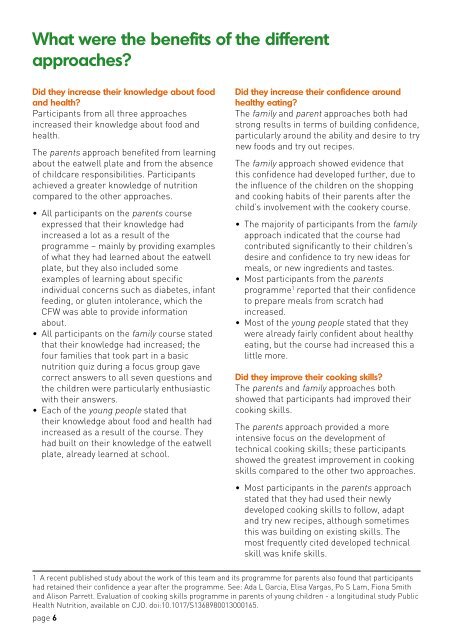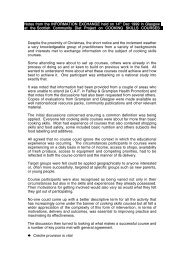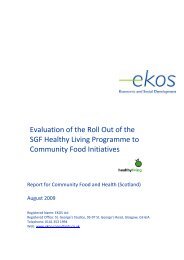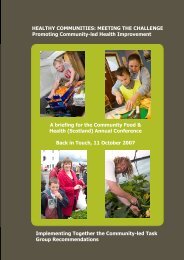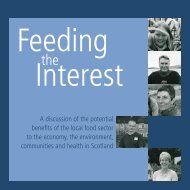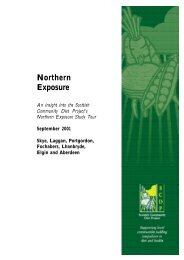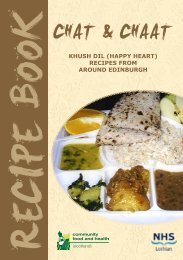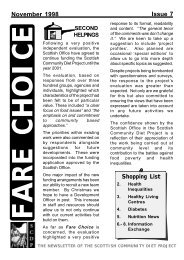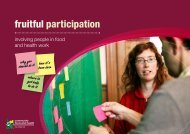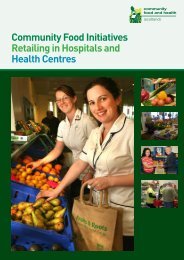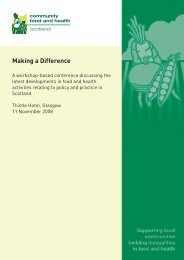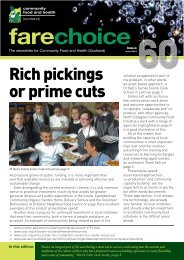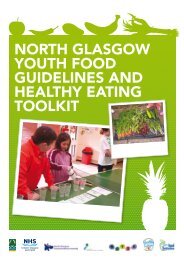The impact of cooking courses on families: - Community Food and ...
The impact of cooking courses on families: - Community Food and ...
The impact of cooking courses on families: - Community Food and ...
Create successful ePaper yourself
Turn your PDF publications into a flip-book with our unique Google optimized e-Paper software.
What were the benefits <str<strong>on</strong>g>of</str<strong>on</strong>g> the different<br />
approaches<br />
Did they increase their knowledge about food<br />
<strong>and</strong> health<br />
Participants from all three approaches<br />
increased their knowledge about food <strong>and</strong><br />
health.<br />
<str<strong>on</strong>g>The</str<strong>on</strong>g> parents approach benefited from learning<br />
about the eatwell plate <strong>and</strong> from the absence<br />
<str<strong>on</strong>g>of</str<strong>on</strong>g> childcare resp<strong>on</strong>sibilities. Participants<br />
achieved a greater knowledge <str<strong>on</strong>g>of</str<strong>on</strong>g> nutriti<strong>on</strong><br />
compared to the other approaches.<br />
• All participants <strong>on</strong> the parents course<br />
expressed that their knowledge had<br />
increased a lot as a result <str<strong>on</strong>g>of</str<strong>on</strong>g> the<br />
programme – mainly by providing examples<br />
<str<strong>on</strong>g>of</str<strong>on</strong>g> what they had learned about the eatwell<br />
plate, but they also included some<br />
examples <str<strong>on</strong>g>of</str<strong>on</strong>g> learning about specific<br />
individual c<strong>on</strong>cerns such as diabetes, infant<br />
feeding, or gluten intolerance, which the<br />
CFW was able to provide informati<strong>on</strong><br />
about.<br />
• All participants <strong>on</strong> the family course stated<br />
that their knowledge had increased; the<br />
four <strong>families</strong> that took part in a basic<br />
nutriti<strong>on</strong> quiz during a focus group gave<br />
correct answers to all seven questi<strong>on</strong>s <strong>and</strong><br />
the children were particularly enthusiastic<br />
with their answers.<br />
• Each <str<strong>on</strong>g>of</str<strong>on</strong>g> the young people stated that<br />
their knowledge about food <strong>and</strong> health had<br />
increased as a result <str<strong>on</strong>g>of</str<strong>on</strong>g> the course. <str<strong>on</strong>g>The</str<strong>on</strong>g>y<br />
had built <strong>on</strong> their knowledge <str<strong>on</strong>g>of</str<strong>on</strong>g> the eatwell<br />
plate, already learned at school.<br />
Did they increase their c<strong>on</strong>fidence around<br />
healthy eating<br />
<str<strong>on</strong>g>The</str<strong>on</strong>g> family <strong>and</strong> parent approaches both had<br />
str<strong>on</strong>g results in terms <str<strong>on</strong>g>of</str<strong>on</strong>g> building c<strong>on</strong>fidence,<br />
particularly around the ability <strong>and</strong> desire to try<br />
new foods <strong>and</strong> try out recipes.<br />
<str<strong>on</strong>g>The</str<strong>on</strong>g> family approach showed evidence that<br />
this c<strong>on</strong>fidence had developed further, due to<br />
the influence <str<strong>on</strong>g>of</str<strong>on</strong>g> the children <strong>on</strong> the shopping<br />
<strong>and</strong> <str<strong>on</strong>g>cooking</str<strong>on</strong>g> habits <str<strong>on</strong>g>of</str<strong>on</strong>g> their parents after the<br />
child’s involvement with the cookery course.<br />
• <str<strong>on</strong>g>The</str<strong>on</strong>g> majority <str<strong>on</strong>g>of</str<strong>on</strong>g> participants from the family<br />
approach indicated that the course had<br />
c<strong>on</strong>tributed significantly to their children’s<br />
desire <strong>and</strong> c<strong>on</strong>fidence to try new ideas for<br />
meals, or new ingredients <strong>and</strong> tastes.<br />
• Most participants from the parents<br />
programme 1 reported that their c<strong>on</strong>fidence<br />
to prepare meals from scratch had<br />
increased.<br />
• Most <str<strong>on</strong>g>of</str<strong>on</strong>g> the young people stated that they<br />
were already fairly c<strong>on</strong>fident about healthy<br />
eating, but the course had increased this a<br />
little more.<br />
Did they improve their <str<strong>on</strong>g>cooking</str<strong>on</strong>g> skills<br />
<str<strong>on</strong>g>The</str<strong>on</strong>g> parents <strong>and</strong> family approaches both<br />
showed that participants had improved their<br />
<str<strong>on</strong>g>cooking</str<strong>on</strong>g> skills.<br />
<str<strong>on</strong>g>The</str<strong>on</strong>g> parents approach provided a more<br />
intensive focus <strong>on</strong> the development <str<strong>on</strong>g>of</str<strong>on</strong>g><br />
technical <str<strong>on</strong>g>cooking</str<strong>on</strong>g> skills; these participants<br />
showed the greatest improvement in <str<strong>on</strong>g>cooking</str<strong>on</strong>g><br />
skills compared to the other two approaches.<br />
• Most participants in the parents approach<br />
stated that they had used their newly<br />
developed <str<strong>on</strong>g>cooking</str<strong>on</strong>g> skills to follow, adapt<br />
<strong>and</strong> try new recipes, although sometimes<br />
this was building <strong>on</strong> existing skills. <str<strong>on</strong>g>The</str<strong>on</strong>g><br />
most frequently cited developed technical<br />
skill was knife skills.<br />
• <str<strong>on</strong>g>The</str<strong>on</strong>g> majority <str<strong>on</strong>g>of</str<strong>on</strong>g> parents or carers from the<br />
family approach indicated that the course<br />
had provided an opportunity for their child<br />
to try new techniques, including knife skills;<br />
this gave parents the c<strong>on</strong>fidence to replicate<br />
these activities with their child at home.<br />
• A small number <str<strong>on</strong>g>of</str<strong>on</strong>g> the young people<br />
indicated that their <str<strong>on</strong>g>cooking</str<strong>on</strong>g> skills had<br />
improved a lot, particularly those with less<br />
experience or fewer skills.<br />
Did they attempt to change their behaviour to<br />
improve nutriti<strong>on</strong><br />
All <str<strong>on</strong>g>of</str<strong>on</strong>g> the approaches had made some <str<strong>on</strong>g>impact</str<strong>on</strong>g><br />
linked to improved nutriti<strong>on</strong>. <str<strong>on</strong>g>The</str<strong>on</strong>g>se changes<br />
were much more evident with the parents <strong>and</strong><br />
family approaches, in particular the family<br />
approach.<br />
<str<strong>on</strong>g>The</str<strong>on</strong>g> family approach had clear advantages<br />
because <str<strong>on</strong>g>of</str<strong>on</strong>g> the family b<strong>on</strong>ding (emoti<strong>on</strong>al<br />
<strong>and</strong> practical) that took place during cookery,<br />
which led to the desire <strong>and</strong> motivati<strong>on</strong> to<br />
replicate activities at home.<br />
• Each family provided relevant examples <str<strong>on</strong>g>of</str<strong>on</strong>g><br />
how the cookery course had c<strong>on</strong>tributed to<br />
positive changes in <str<strong>on</strong>g>cooking</str<strong>on</strong>g> habits at home;<br />
the biggest change was the reducti<strong>on</strong> in<br />
ready meals bought. All participants<br />
reported that they were trying to cook <strong>and</strong><br />
eat more fruit <strong>and</strong> vegetables.<br />
• <str<strong>on</strong>g>The</str<strong>on</strong>g> majority <str<strong>on</strong>g>of</str<strong>on</strong>g> participants from the<br />
parents approach reported that they were<br />
involving their children more with cookery<br />
preparati<strong>on</strong> <strong>and</strong> using the Munch Crunch<br />
2 recipe book as a guide. <str<strong>on</strong>g>The</str<strong>on</strong>g> majority <str<strong>on</strong>g>of</str<strong>on</strong>g><br />
participants stated that they were moving<br />
towards eating more fruit <strong>and</strong> vegetables,<br />
although many were already aware <str<strong>on</strong>g>of</str<strong>on</strong>g> the ‘5<br />
a day’ message. 2<br />
• Although all the young people indicated<br />
an increased c<strong>on</strong>fidence to eat healthy food,<br />
<strong>on</strong>ly a few gave examples <str<strong>on</strong>g>of</str<strong>on</strong>g> changing their<br />
behaviour – possibly partly due to being less<br />
able to influence the family diet. Those who<br />
were more involved with <str<strong>on</strong>g>cooking</str<strong>on</strong>g> at home,<br />
or with more interest in <str<strong>on</strong>g>cooking</str<strong>on</strong>g>, gave some<br />
examples <str<strong>on</strong>g>of</str<strong>on</strong>g> trying recipes again at home.<br />
What other outcomes were there bey<strong>on</strong>d<br />
nutriti<strong>on</strong><br />
Both the parents <strong>and</strong> family approaches<br />
highlighted the social benefits <str<strong>on</strong>g>of</str<strong>on</strong>g> the course,<br />
including meeting new people. Participants<br />
benefited from the informal, friendly<br />
approaches <str<strong>on</strong>g>of</str<strong>on</strong>g> the sessi<strong>on</strong>s.<br />
Around half <str<strong>on</strong>g>of</str<strong>on</strong>g> the parents or carers in<br />
the family group reported that they had<br />
learnt skills or ideas to improve their food<br />
budgeting, mostly highlighting porti<strong>on</strong> c<strong>on</strong>trol<br />
<strong>and</strong> freezing excess food. Likewise, a small<br />
amount <str<strong>on</strong>g>of</str<strong>on</strong>g> the participants from the parents<br />
approach had picked up m<strong>on</strong>ey-saving<br />
ideas around freezing spare food <strong>and</strong> using<br />
supermarket own br<strong>and</strong>ed products.<br />
“I’ve noticed that I save m<strong>on</strong>ey with the new<br />
methods (from the programme) <strong>and</strong> the food<br />
is tastier.”<br />
Parent <strong>on</strong> parents approach programme<br />
A few parents or carers from both the family<br />
<strong>and</strong> parents approaches highlighted that the<br />
sessi<strong>on</strong>s had helped improve their child’s<br />
behaviour; examples included participants<br />
reporting that their child was more involved in<br />
household tasks, including cleaning up.<br />
<str<strong>on</strong>g>The</str<strong>on</strong>g> young people indicated that the inclusi<strong>on</strong><br />
<str<strong>on</strong>g>of</str<strong>on</strong>g> the REHIS accredited food hygiene training<br />
was a major attracti<strong>on</strong> to taking part in<br />
the course. <str<strong>on</strong>g>The</str<strong>on</strong>g>y appreciated having an<br />
opportunity to complete a certificate that<br />
could enhance their employability prospects,<br />
whether or not they planned to work in the<br />
catering industry.<br />
“<str<strong>on</strong>g>The</str<strong>on</strong>g> best bit was when I found out I had got<br />
a qualificati<strong>on</strong>. Basically, I’m not very good at<br />
school <strong>and</strong> I’m not going to get qualificati<strong>on</strong>s.<br />
It will probably encourage me to do more.”<br />
Young pers<strong>on</strong><br />
1 A recent published study about the work <str<strong>on</strong>g>of</str<strong>on</strong>g> this team <strong>and</strong> its programme for parents also found that participants<br />
had retained their c<strong>on</strong>fidence a year after the programme. See: Ada L Garcia, Elisa Vargas, Po S Lam, Fi<strong>on</strong>a Smith<br />
<strong>and</strong> Alis<strong>on</strong> Parrett. Evaluati<strong>on</strong> <str<strong>on</strong>g>of</str<strong>on</strong>g> <str<strong>on</strong>g>cooking</str<strong>on</strong>g> skills programme in parents <str<strong>on</strong>g>of</str<strong>on</strong>g> young children - a l<strong>on</strong>gitudinal study Public<br />
Health Nutriti<strong>on</strong>, available <strong>on</strong> CJO. doi:10.1017/S1368980013000165.<br />
2 A recent published study about the work <str<strong>on</strong>g>of</str<strong>on</strong>g> this team <strong>and</strong> its programme for parents found that participants reported<br />
frequency <str<strong>on</strong>g>of</str<strong>on</strong>g> fruit <strong>and</strong> vegetable intake was lower than 5 porti<strong>on</strong>s per day at base-line. See: reference <strong>on</strong> page 6.<br />
page 6 page 7


